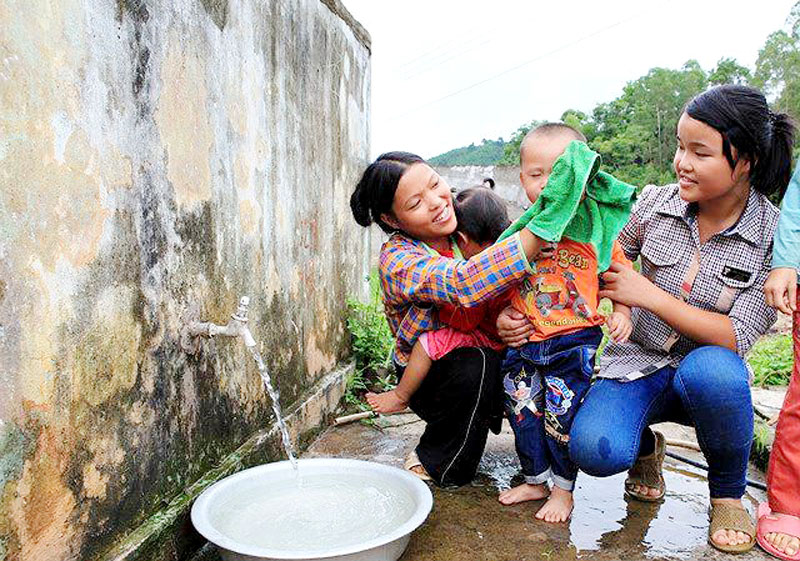
(HBO) - The resolution released at the 15th Hoa Binh Party Congress for the 2015-2020 tenure sets a target of 95 percent of rural locals accessing clean water by 2020. To this end, over the years, the province has focused on implementing many programmes and projects to mobilise resources for rural water supply and environmental sanitation.
Over the years, thanks
to support of the State, locals in Giap Dat commune of Da Bac district have
enjoyed clean water.
One of the key programmes in the field that has been sped up
is an outcome-based project on expanding the coverage of rural sanitation and
clean water for the 2016-2020 period, using loans from the World Bank.
The National Target Programme on New-Style Rural Area has
defined the focus of investment in realising the target of raising the ratio of
rural people accessing clean water in communes covered by the programme.
After years of overcoming difficulties, the national target
programme on clean water and rural environmental sanitation has gained
considerable achievements. The ratio of rural people accessing clean water
reached 91.5 percent, while 85.6 percent of poor households enjoyed clean
water.
The rate of schools having clean water and hygienic toilets is
80.9 percent, while the rate of communal health care station with clean water
and hygienic toilets is 90.1 percent.
The resolution of the 15th provincial Party Congress sets
that by 2020, 95 percent of rural people enjoy clean water, 75 percent of rural
households have hygienic toilets, 100 percent of schools and health care
stations have hygienic toilets and clean water works, and the majority of regional
health care stations are equipped with hygienic toilets, water supply work and
hand cleansing equipment.
Compared to the goals, the province has nearly completed the
target of the ratio of rural people accessing clean water.
According to the provincial Party Committee, at the end of
2018, six targets set in the resolutions were completed and exceeded, while
among the remaining nine targets, the goal of the ratio of rural people
accessing clean water was nearly finished. This is a good condition for the
province to complete and surpass the target in the future, thus improving the
public health and people’s living conditions, contributing to the sustainable
socio-economic development in the locality./.
The Hoa Binh provincial People's Committee held its monthly meeting on March 26 to review the progress of key projects, assess budget revenue and public investment disbursement, provide feedback on draft documents for submission to the provincial Party Committee's Standing Board, and discuss other important matters related to the committee's governance activities.
Playing a key role in Hoa Binh province’s economic development, Luong Son district has been focusing on science and technology development, innovation, and digital transformation.
Identifying the application of online public services as a key step in administrative procedure reform and e-government building, Kim Boi district has proactively provided services and supported residents and businesses in accessing and utilising full-process online public services promptly and efficiently. The locality aims to lift the rate of end-to-end online public services to over 90%, with all officials and civil servants handling tasks in the digital environment.
Nguyen Anh Tuyet, hailing from a family steeped in the ancient art of herbal medicine, is transforming local medicinal herbs into high-value concentrated extracts, elevating their worth and healing potential.
Nguyen Phi Long, an alternate member of the Party Central Committee, Secretary of the Hoa Binh provincial Party Committee, and head of the steering committee for the province's key projects, chaired a conference on March 25 to discuss measures for implementing the project on constructing the Hoa Lac - Hoa Binh road and upgrading the Xuan Mai - Hoa Binh section of National Highway 6 under the public-private partnership (PPP) model.
Administrative reform has been identified as a key priority in enhancing state governance, improving the business environment, and facilitating services for citizens and enterprises.



